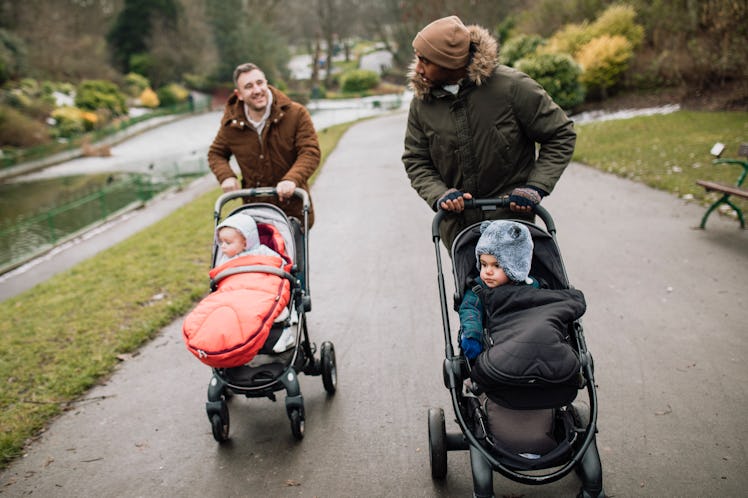How Do Kids Learn To Make Friends? They Look To Dad
By teaching them how to play and offering a particular kind of emotional and social support, dads are crucial to pave the way for kids’ friendships.

Friendship, in many ways, determines who we become. And who a child ends up befriending — and how they befriend them — is within a parent’s control. When it comes to the development of children’s social skills — their relationships with peers and friends, their capacities to resolve conflict and their abilities to concentrate — parents are essential, and fathers play an outsize role. Think of dad as the provider of social opportunities, the guy who gets the party going. For most children, his example will become a route to resilience and lifelong social engagement.
Fathers’ participation in social and emotional learning begins with infants’ early attachment. Having secure attachment with fathers as well as mothers in infancy bequeaths long-term benefits in terms of social skills. It is the start of a lengthy, continuous process that leads to other patterns of interactions, notably during play.
Children’s play with their fathers is often the physical context in which children develop social skills they need to make and keep friends. It provides the guidebook for how to manage relationships.
In studies, we observed fathers who moderated their physical play to a pace that suited their children, slowing down when the child was getting overwhelmed and being sensitive to facial expressions that called for gentler play. We observed that if a child was too unruly, dads’ facial expressions communicated to children that they should moderate their behavior. The children of fathers capable of this sort of mutual regulation were more socially successful with peers. They had learned how to recognize and produce the emotional cues for managing relationships. They knew how to avoid becoming too angry or sad or flat, and how to keep their emotions at levels that were not too exhausting. They were resilient.
The following originally appeared in a different format on the Child & Family Blog, transforming research on cognitive, social, and emotional development and family dynamics into policy and practice.
My work has also demonstrated that successful playful interaction with fathers in first grade is correlated to better concentration skills and predictive of academic achievement in third grade. Good father play is also linked to politeness and the capacity to display a positive attitude in the face of disappointment. In short, children gain a package of social and emotional learning in their interactions with their fathers that they can apply to a variety of situations.
Strong, healthy attachments, of course, are not limited to fathers. Children who are securely attached to both their mothers and fathers typically expect that the world will be a positive place and will respond to them in positive ways. Mothers are very important for children’s emotional development and managing relationships with friends. However, their contributions often take a different form. They are more likely to provide the language or vocabulary of emotion and to deliver it in a didactic/teaching format. Fathers tend more to provide their social and emotional learning in an interactional/playful context and in less linguistic form.
Well-adapted children typically have fathers who advise them on relationships and exemplify how to repair them including how to solve problems together and rectify past wrongs. These are cognitive templates for maintaining good relationships with friends and others.
Decades of work on how mothers and fathers resolve conflict also shows that after parents have a falling out, if they resolve things in a constructive way, the children will do better and be more able to manage their own emotions.
How to Foster a Healthy Social Life for Your Kid
If you break it down, fathers’ contributions to children’s social skills come in three parts: secure attachment and social interaction; advice on problem-solving for relationships with friends or peers, and showing how mom and dad resolve their conflicts. The best way to increase all of these is with involvement.
Supporting secure attachment and good interaction starts in the delivery room. We filmed new fathers being instructed about how to feed and hold a baby. Just 15 minutes made a difference to their parental competence three months later. Healthcare practitioners should recognize that they are supporting a family unit, not just a mother-infant pair.
Dads are underestimated and undermined when it comes to their children’s role in the development of social skills. The dad dance — the to-and-fro of father-child interaction in which each grows sensitive and responsive to the other — is a rhythm that children ultimately transfer to relationships with friends, peers, and the adult world. We should do everything we can to help them get the rhythm right.
- Dads are the point-parent for developing social skills in children.
- Successful playful interaction with fathers in first grade are correlated to better concentration skills in children and was predictive of academic achievement in third grade.
- Dads are underestimated and undermined when it comes to their children’s role in the development of social skills.
Professor Ross D. Parke is a professor of psychology, emeritus, and past director of the Center for Family Studies at the University of California, Riverside. His research focuses on the changing roles of fathers and other caregivers in both Latino and European American families.
This article was originally published on